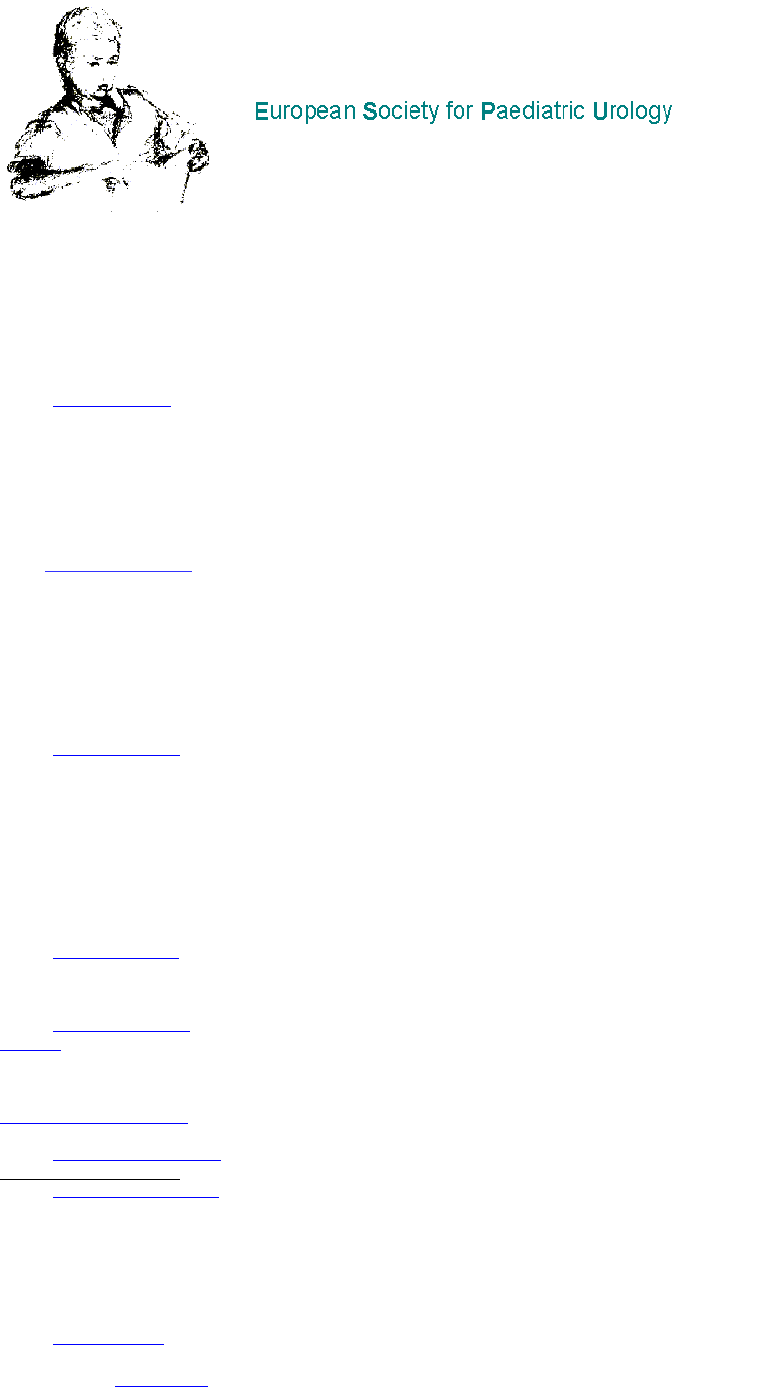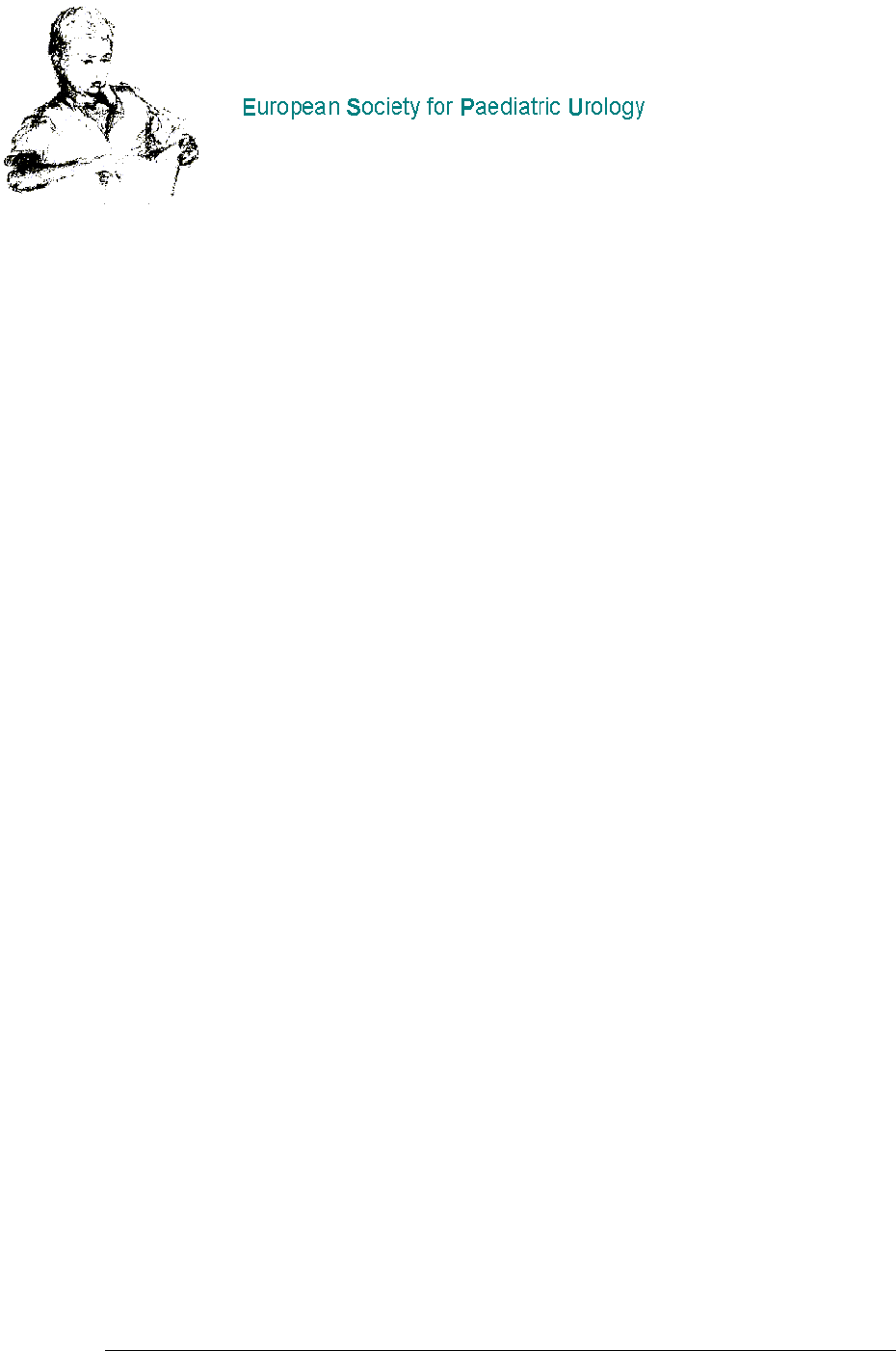
ESPU BOARD
President
Prof. Guy Bogaert
UZ Gasthuisberg
Urology – Paediatric Urology
Herestraat 49
B-300 Leuven
BELGIUM
Tel: +32 16 34 66 98
e-mail : bogaert@espu.org
President Elect
Prof. Henri Lottmann
Hôpital Necker-Enfants Malades
Paediatric Urology
149 Rue de Sèvres
F-75015 Paris
FRANCE
Tel: +33 1 44 49 40 00
e-mail : h.lottmann@espu.org
Secretary
Prof. R. Subramaniam
Leeds Teaching Hospitals
NHS Trust
Great George Street
Leeds LSX 3EX
UNITED KINGDOM
Tel +44 113 206 48 40
e-mail : secretary@espu.org
Treasurer
Prof. P. Hoebeke
Ghent University Hospital
Paediatric Urology-Urogenital
Reconstruction
De Pintelaan 185
B-9000 Ghent
BELGIUM
Tel +32 9 332 22 81
e-mail : treasurer@espu.org
Members
Prof. C. Radmayr
e-mail :
christian.radmayr@i-
med.ac.at
Prof. A. El-Ghoneimi
(Chair Scientific committee
e-mail :
alaa.elghoneimi@rdb.aphp.fr
Dr. Katja Wolffenbuttel
e-mail : k.wolffenbuttel@espu.org
Prof. Pedro Lopez Pereira
e-mail : p.lopez-pereira@espu.org
Nurse Group
Mr Jens Larsson
(President)
Kristianstad Hospital CSK
Department of Paediatrics
Kristianstad Swedenen
e-mail : nu[email protected]
ESPU Web Site : www.espu.org
Open letter to the Council of Europe
After reading the Recommendation issue 2191 of the Parliamentary
Assembly of the Council of Europe (PACE), published 12 October 2017, we
would like to compliment the authorities that compiled this report for their
dedication and effort into this complex and comprehensive dossier on DSD.
This statement lists many thorough proposals, like the call to concentrate
treatment of patients with DSD in specialized centers for multidisciplinary
patient-centered care. We would like to extend this concept to:
‘multidisciplinary patient- and family-centered care’, as will be substantiated
below. In many countries this objective is already largely implemented into
medical practice, as evidenced by some recent surveys [1-3].
As medical professionals active in these specialized centers for
multidisciplinary, patient- and family-centered care, we also recognize the
call to break any secrecy, shame and stigmatization. We support the
committee’s advice to provide full disclosure to patients and their parents,
and to facilitate physical, psychological and social conditions for children
and adolescents to grow and develop, and enabling them to fully participate
in society, both while growing up and in adulthood. This is in line with the
recommendations made in 2005 by an international consortium of medical
and scientific professionals as well as patient representatives during the so-
called Chicago consensus meeting [4].
This report however also includes some important caveats. We oppose to the
use of the terminology: ‘intersex people’ and ‘intersex children’, as these
terms are poorly defined and not synonymous with DSD, the latter being
clearly defined as a group of distinct congenital conditions in which
development of chromosomal, gonadal or anatomical sex is atypical.
Moreover, most DSD patients prefer the use of the specific etiological name
when referring to their condition, and disapprove of the term intersex, which
they perceive as annoying, confusing, and stigmatizing [5,6].
Soon after the introduction of the term DSD in 2005, intended to overcome
at least some of the objections against the old nomenclature, including the
term intersex, it became clear that this substitution also elicited negative
perceptions. As especially the word: ‘Disorders’ had a negative connotation,
the terms: ‘Differences’ and ‘Variances’ are at present increasingly used as
alternatives to meet this demur [6]. Recently the term: ‘atypical genital
development’ was proposed as an alternative to address to DSD-conditions
as a group [7].

There is however a more worrying issue than semantics, namely paragraph 7, in particular 7.1.1, 7.1.2 and
7.5, dealing with medico-surgical care for children with DSD. Indicating that surgical interventions in
children with DSD should only be applied in emergency conditions is discordant with the definition of
health according to the World Health Organization (WHO), stating that health is not merely the absence of
disease, but is a much broader concept, including physical, mental, and social domains. This especially
applies to children, as favorable physical, social and emotional conditions are all critical factors for their
optimal growth and development, which enables them to reach their full potential at adult age. As social and
emotional interactions with the parents, being the most important adults in a young child’s life, form the
basis for their future, treatment of children with DSD can best be organized in a patient- and family-centered
multidisciplinary setting, in an atmosphere based on openness, commitment and trust. We, physicians who
daily take care of children with a variety of congenital conditions, alike their parents, are committed to the
current as well as the future health and well-being of all children entrusted to our care. In contrast to what is
alleged in this recommendation, parents implicitly act in the best interest of their children and should be
respected as their outstanding representatives, and should not be put aside by claiming prohibition
regulations regarding the well-informed decisions they make on their behalf.
We are aware that society is in motion and constantly changing, and welcome the current evolution, to
which this report has made a significant contribution, towards a less divided and polarized humanity, where
everyone is respected. However medical treatments are evolving too, and it may happen that therapies that
were once standard are nowadays no longer applied. These changes are mainly based on scientific progress,
continuous evaluation and resulting adjustments of treatments. Retrospective judgement of treatments
applied in the past, although regrettable for all people who experience negative experiences or harm, is
therefore incorrect.
Counseling parents and children with DSD in a patient- and family-centered multidisciplinary setting should
be complete and unbiased, and based on available scientific and condition-related outcome information. We
also encourage patients and parents to obtain information from other sources, especially from patient support
societies. We have learned that a ‘one size fits all’ treatment does not exist for patients with DSD: treatment
should be tailored to individual needs, taking into account all medical, psychological, social, and cultural
considerations of the patient and its parents. All treatment options, including the pros and cons of each
choice, are discussed extensively and repeatedly to ensure a well-considered shared decision. Advocating a
ban on medico-surgical treatment contradicts the atmosphere of equality, openness and trust as is currently
provided in the various patient- and family-centers for DSD care, and is actually a step backwards in
evolution rather than forwards. We call society to entrust the care of children with DSD to their well-
informed, committed parents and dedicated professionals of a multidisciplinary center.
We advocate to keep the dialogue open with the professionals active in specialized centers for
multidisciplinary, patient- and family-centered care as well as with patient societies, for which the present
resolution is recognized as being a solid starting base.
Board of the ESPU
January 25, 2018
Document prepared by Wolffenbuttel KP and Hoebeke P, approved by the board of the ESPU.

References
[1] Yankovic F, Cherian A, Steven L, Mathur A, Cuckow P. Current practice in feminizing surgery for
congenital adrenal hyperplasia; A specialist survey. J Ped Urol 2013;9:1103-1107.
[2] Rolston AM, Gardner M, van Leeuwen K, Mohnach L, Keegan C, Délot E, et al. Disorders of sex
development (DSD): Clinical service delivery in the United States. Am J Med Genet 2017;175C:
268-278.
[3] Pasterski V, Prentice P, Hughes IA. Consequences of the Chicago consensus on disorders of sex
development (DSD): current practices in Europe. Arch Dis Child 2010;95:618-623.
[4] Lee PA, Houk CP, Ahmed SF, Hughes IA. International Consensus Conference on Intersex
organized by the Lawson Wilkins Pediatric Endocrine Society and the European Society for
Paediatric Endocrinology. Consensus statement on management of intersex disorders. Pediatr
2006;118:e488-e500.
[5] Davies JH, Knight EJ, Savage A, Brown J, Malone PS. Evaluation of terminology used to describe
disorders of sex development. J Ped Urol 2011;7:412-415.
[6] Cools M, Simmonds M, Elford S, Gorter J, Ahmed SF, D’Alberton F, et al. et al. Response to the
council of Europe Human Rights Commissioner’s issue paper on human rights and intersex people.
Eur Urol 2016;70:407-409.
[7] Mouriquand P. Commentary to “Attitudes towards ‘disorders of sex development’ nomenclature
among affected”. J Ped Urol 2017;13:609.
ESPU VZW, Herestraat 49, B-3000 Leuven
Tel.: +32 494/63 10 46
IBAN : BE24 3630 9742 6638 - SWIFT : BBRUBEBB (congress)
IBAN: BE11 3630 9247 0948 - SWIFT: BBRU BE BB 010
BE 0838.481.658
